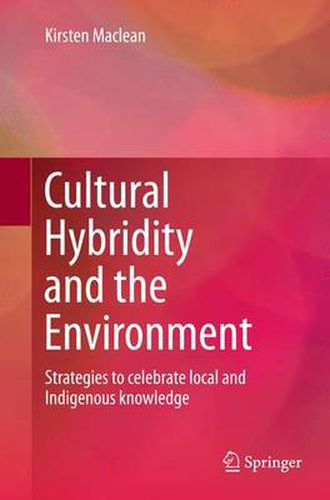Readings Newsletter
Become a Readings Member to make your shopping experience even easier.
Sign in or sign up for free!
You’re not far away from qualifying for FREE standard shipping within Australia
You’ve qualified for FREE standard shipping within Australia
The cart is loading…






This title is printed to order. This book may have been self-published. If so, we cannot guarantee the quality of the content. In the main most books will have gone through the editing process however some may not. We therefore suggest that you be aware of this before ordering this book. If in doubt check either the author or publisher’s details as we are unable to accept any returns unless they are faulty. Please contact us if you have any questions.
This book highlights the importance of diversity in overcoming issues of social and environmental degradation. It presents conceptual and practical strategies to celebrate local and Indigenous knowledge for improved community development and environmental management.
David Harvey has proclaimed, The geography we make must be a peoples’ geography. This clarion call challenges geographers around the world to consider the power and potential of geographic knowledge as the basis for social action - a call this book answers, providing readers the theoretical and conceptual tools needed to understand the social world and empowering them to mobilize social change.
The author uses empirical case studies of two environmental management and community development projects to document how knowledge generation is essentially locally situated and socially derived. In doing so she charts a path for moving beyond what Vandana Shiva so aptly describes as monocultures of the mind. The book argues that local and Indigenous knowledge must not be seen in opposition to scientific knowledge, as none of these knowledge traditions hold all the answers to localized socio-environmental problems. Rather, as the author explores through a set of processes and strategies to enable, support and celebrate ‘cultural hybridity’ at the local environmental governance scale, these respective knowledge systems can learn to speak to each other. Such dialogue has the potential to support more sustainable outcomes at multiple environmental governance locales.
This book will be of interest to everyone involved in environmental policy, planning or politics, and for those who want to make this planet a more sustainable and just place.
$9.00 standard shipping within Australia
FREE standard shipping within Australia for orders over $100.00
Express & International shipping calculated at checkout
This title is printed to order. This book may have been self-published. If so, we cannot guarantee the quality of the content. In the main most books will have gone through the editing process however some may not. We therefore suggest that you be aware of this before ordering this book. If in doubt check either the author or publisher’s details as we are unable to accept any returns unless they are faulty. Please contact us if you have any questions.
This book highlights the importance of diversity in overcoming issues of social and environmental degradation. It presents conceptual and practical strategies to celebrate local and Indigenous knowledge for improved community development and environmental management.
David Harvey has proclaimed, The geography we make must be a peoples’ geography. This clarion call challenges geographers around the world to consider the power and potential of geographic knowledge as the basis for social action - a call this book answers, providing readers the theoretical and conceptual tools needed to understand the social world and empowering them to mobilize social change.
The author uses empirical case studies of two environmental management and community development projects to document how knowledge generation is essentially locally situated and socially derived. In doing so she charts a path for moving beyond what Vandana Shiva so aptly describes as monocultures of the mind. The book argues that local and Indigenous knowledge must not be seen in opposition to scientific knowledge, as none of these knowledge traditions hold all the answers to localized socio-environmental problems. Rather, as the author explores through a set of processes and strategies to enable, support and celebrate ‘cultural hybridity’ at the local environmental governance scale, these respective knowledge systems can learn to speak to each other. Such dialogue has the potential to support more sustainable outcomes at multiple environmental governance locales.
This book will be of interest to everyone involved in environmental policy, planning or politics, and for those who want to make this planet a more sustainable and just place.